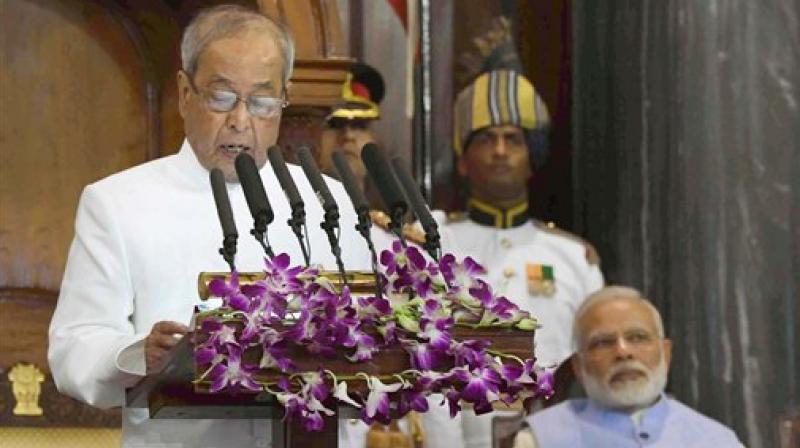GST a disruptive change, tribute to India's democracy: Pranab Mukherjee
Mukherjee also said the GST Council should continuously review the implementation and suggest suitable improvements.

New Delhi: President Pranab Mukerjee on Saturday described the Goods and Service Tax as a "disruptive change" that is bound to have some teething troubles which will have to be resolved quickly to ensure growth momentum in the economy is not impacted.
"When a change of this magnitude is undertaken, however positive it may be, there are bound to be some teething troubles and difficulties in the initial stages," he said minutes before the GST rollout in his speech at a special function in the Central Hall of Parliament.
"We will have to solve these with understanding and speed to ensure that it does not impact the growth momentum of the economy. Success of such major changes always depends on their effective implementation," he said.
He also said the GST Council should continuously review the implementation and suggest suitable improvements to the new indirect taxation regime.
"The new era in taxation, which we are about to initiate in a few minutes, is the result of a broad consensus arrived at between the Centre and states," Mukherjee said.
"This consensus took not only time but also effort to build. The effort came from persons across the political spectrum who set aside narrow partisan considerations and put the nation’s interests first. It is a tribute to the maturity and wisdom of India's democracy," he said.
Recalling his days as Finance Minister, Mukherjee said he introduced Constitution Amendment Bill in 2011. "It is also a moment of some satisfaction for me because, as the Finance Minister, I had introduced the Constitution Amendment Bill on March 22, 2011," he said. "I was closely involved in the design and implementation and had the occasion to meet the Empowered Committee of state finance ministers, formally and informally, as many as 16 times.
"I also met the Chief Ministers of Gujarat, Bihar, Andhra Pradesh and Maharashtra a number of times. I have a vivid recollection of those meetings and the various matters that were raised," he said.
"Yet, I found both in those meetings and in my many interactions with Chief Ministers, Finance Ministers and officers of states, that most of them had a constructive approach and an underlying commitment to the introduction of GST," he added.
Mukherjee recalled the proposal to introduce GST was first mooted in the Budget Speech for the financial year 2006-07.
The President said his confidence stood justified when on September 8, 2016, after the Bill was passed by both Houses of Parliament and more than 50 per cent of State Legislatures, he had the privilege of giving assent to the Constitution (One Hundred and First Amendment) Act.
The President called upon "every Indian to extend cooperation in the successful implementation of the new system".
On implementation issue, Mukherjee said GST is similar to the introduction of VAT (Value Added Tax) when there was initial resistance.
"In the months to come, based on the experience of actual implementation, the GST Council and the Central and state governments should continuously review the design and make improvements, in the same constructive spirit as has been displayed till now," he said.
Observing that the GST will be administered through a modern world-class information technology system, he also recalled that in July 2010, he had set up an Empowered Group for development of IT systems required for the GST regime under the chairmanship of Nandan Nilekani.
He observed that given the magnitude of the task, it was not a surprise that there were many contentious issues. Under GST, Mukherjee said the tax incidence will be transparent, enabling full removal of tax burden on exports and full incidence of domestic taxes on imports. By creating a unified common national market, the GST will act as a major boost to economic efficiency, tax compliance and domestic and foreign investment, the President said.
He said the GST will "also make our exports more competitive and also provide a level playing field to domestic industry to compete with imports."
Currently due to cascading, exports still carry some embedded taxes, making them less competitive, he said, adding, the hidden effect of cascading means that the total tax incidence on domestic industry is not transparent.

